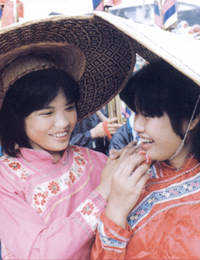 With a population of over 71,968 (as of 1990), the Maonans are concentrated in the upper, middle and lower reaches of the Huanjiang River in Guangxi Zhuang Autonomous Region.
With a population of over 71,968 (as of 1990), the Maonans are concentrated in the upper, middle and lower reaches of the Huanjiang River in Guangxi Zhuang Autonomous Region.
The Maonan language belongs to the Dong-Shui branch of the Zhuang-Dong Austronesian of the Chinese-Tibetan Phylum. Almost all the Maonans know both the Han and the Zhuang languages because of long contact with those people.
Legend has it that their ancestors earlier lived in Hunan, Shangdong and Fujian provinces, then emigrated to Guangxi and multiplied by marrying the local women who spoke the Maonan tongue. According to historical records, the name Maonan first appeared in Han documents of the 11th century, accompanying with quite a few other similar names. The Maonans call themselves Anan, meaning indigenes. In 1986, following consultation with the ethnic group, it agreed upon the official name of Maonan ethnic minority.
The Maonan people are chiefly engaged in agriculture, but also have sidelines which yield more than half of their total income, such as weaving bamboo ware, raising beef cattle, making wooden articles and casting iron. Maonan carving and weaving have unique styles. The former comprises wood and stone varieties, delicate and vivid in imagery. The latter is famous for flowery bamboo hats and bamboo mattresses. Sweet potatoes, beef cattle and bamboo hats, are the Three Treasures of the Maonans.
The Maonans pay great attention to education, and they have a relatively high level of civilization among the ethnic groups. Chiefly, they believe in Taoism.
Singing is a popular recreational activity of the Maonans. In addition, they also enjoy "Maonan opera", based on folklore and legends and portraying love affairs, anti-feudal struggles, joys and sorrows, partings and reunions, and the lofty ideals of the people.
The Maonans celebrate the Spring Festival, the Dragon Boat Festival and the Qingming Festival, similar to those of their Han and Zhuang neighbors. However, the Fenglong Festival is unique to the Maonans and is celebrated by offering sacrifices to God and their ancestors to pray for a good harvest. And the Temple Festival is also their traditional festival, which is held on May 5th of the lunar calendar. Their festivals have two characteristics -- offering sacrifices to God, and singing and dancing activities.
